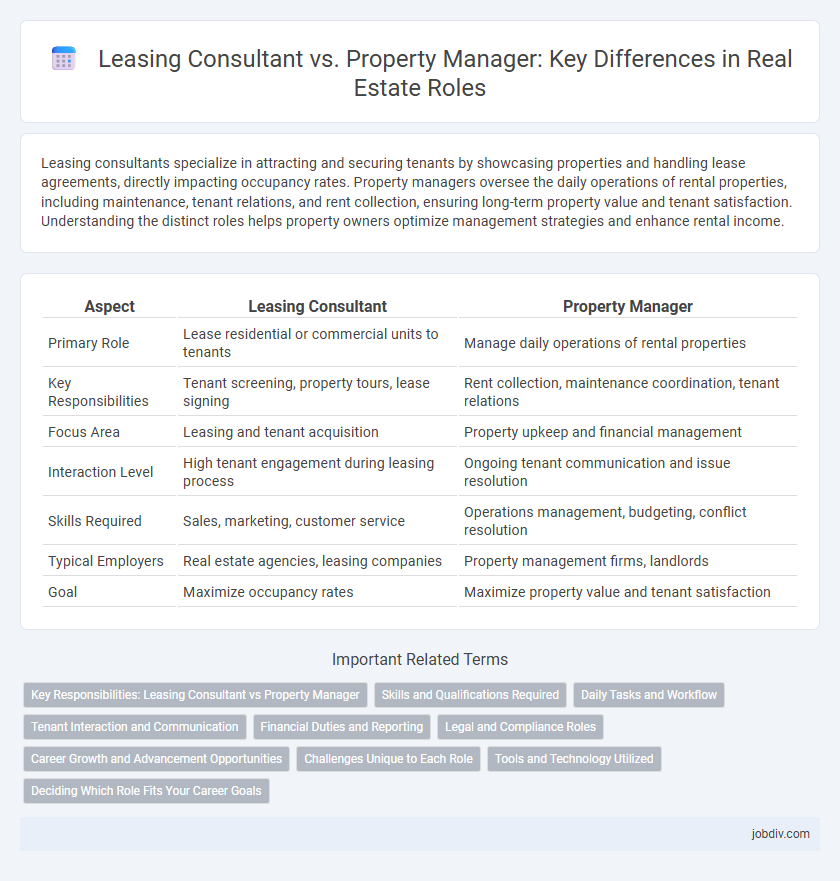Leasing consultants specialize in attracting and securing tenants by showcasing properties and handling lease agreements, directly impacting occupancy rates. Property managers oversee the daily operations of rental properties, including maintenance, tenant relations, and rent collection, ensuring long-term property value and tenant satisfaction. Understanding the distinct roles helps property owners optimize management strategies and enhance rental income.
Table of Comparison
| Aspect | Leasing Consultant | Property Manager |
|---|---|---|
| Primary Role | Lease residential or commercial units to tenants | Manage daily operations of rental properties |
| Key Responsibilities | Tenant screening, property tours, lease signing | Rent collection, maintenance coordination, tenant relations |
| Focus Area | Leasing and tenant acquisition | Property upkeep and financial management |
| Interaction Level | High tenant engagement during leasing process | Ongoing tenant communication and issue resolution |
| Skills Required | Sales, marketing, customer service | Operations management, budgeting, conflict resolution |
| Typical Employers | Real estate agencies, leasing companies | Property management firms, landlords |
| Goal | Maximize occupancy rates | Maximize property value and tenant satisfaction |
Key Responsibilities: Leasing Consultant vs Property Manager
Leasing consultants focus on marketing rental properties, conducting property tours, screening potential tenants, and preparing lease agreements to maximize occupancy rates. Property managers oversee day-to-day operations, including rent collection, maintenance coordination, tenant relations, and enforcing lease terms to maintain property value and ensure compliance. Both roles require strong communication skills, but leasing consultants prioritize tenant acquisition while property managers emphasize property administration and long-term management.
Skills and Qualifications Required
Leasing consultants require strong interpersonal skills, sales expertise, and knowledge of local rental markets to effectively attract and retain tenants. Property managers need comprehensive understanding of property maintenance, budgeting, legal compliance, and conflict resolution to oversee daily operations and ensure property profitability. Both roles demand proficiency in communication, customer service, and familiarity with real estate management software.
Daily Tasks and Workflow
Leasing Consultants primarily focus on marketing rental properties, conducting property tours, and processing tenant applications to ensure high occupancy rates. Property Managers oversee day-to-day operations such as maintenance coordination, rent collection, and tenant relations to maintain property value and resident satisfaction. Both roles require strong communication skills, but Leasing Consultants prioritize tenant acquisition while Property Managers emphasize long-term property management.
Tenant Interaction and Communication
Leasing consultants prioritize tenant interaction by actively marketing properties, conducting tours, and addressing prospective tenant inquiries to secure leases efficiently. Property managers maintain ongoing communication with tenants, handling maintenance requests, rent collection, and lease compliance to ensure resident satisfaction and retention. Effective communication skills in both roles directly influence tenant experience and property profitability.
Financial Duties and Reporting
Leasing consultants primarily handle rent collection, tenant screening fees, and lease documentation while maintaining accurate records for monthly occupancy and income reports. Property managers oversee broader financial duties, including budgeting, expense tracking, vendor payments, and preparing detailed financial statements and variance reports for stakeholders. Both roles require proficiency in financial software to ensure transparent and compliant reporting within real estate operations.
Legal and Compliance Roles
Leasing consultants primarily handle tenant screening, lease agreements, and ensuring compliance with housing laws during the rental process. Property managers oversee broader legal responsibilities such as enforcing lease terms, managing eviction procedures, and maintaining compliance with local property regulations. Both roles require thorough knowledge of fair housing laws and tenancy regulations to minimize legal risks for property owners.
Career Growth and Advancement Opportunities
Leasing consultants often serve as entry-level professionals in real estate, gaining valuable experience in client relations and property marketing, which positions them for advancement into property management roles. Property managers oversee operational aspects of real estate assets, offering opportunities for leadership growth, higher salaries, and expanded responsibilities such as budgeting and tenant retention strategies. Career advancement in these roles frequently leads to senior management positions, portfolio management, or real estate development, driven by skills in negotiation, compliance, and asset optimization.
Challenges Unique to Each Role
Leasing consultants face challenges such as attracting qualified tenants, managing high turnover rates, and maintaining appealing property listings to ensure steady occupancy. Property managers encounter complexities in negotiating vendor contracts, handling maintenance emergencies promptly, and ensuring compliance with local housing laws to protect both owners and residents. Each role demands specialized skills to navigate tenant relations, operational logistics, and financial responsibilities effectively.
Tools and Technology Utilized
Leasing consultants leverage customer relationship management (CRM) software and virtual tour platforms to streamline lead tracking and enhance tenant engagement, while property managers utilize integrated property management systems (PMS) for rent collection, maintenance scheduling, and financial reporting. Both roles increasingly rely on mobile applications and cloud-based solutions to improve communication and operational efficiency. Advanced data analytics tools are also employed to optimize occupancy rates and forecast market trends, driving strategic decision-making in property management.
Deciding Which Role Fits Your Career Goals
Leasing consultant roles primarily involve tenant acquisition, marketing rental properties, and managing lease agreements, ideal for those interested in sales and customer interaction. Property managers focus on overseeing daily operations, maintenance, tenant relations, and financial management, suited for individuals aiming for leadership and operational oversight. Evaluating personal strengths and career objectives in real estate will help determine whether a sales-driven leasing consultant position or an administrative property manager role aligns best with your professional growth.
Leasing Consultant vs Property Manager Infographic

 jobdiv.com
jobdiv.com